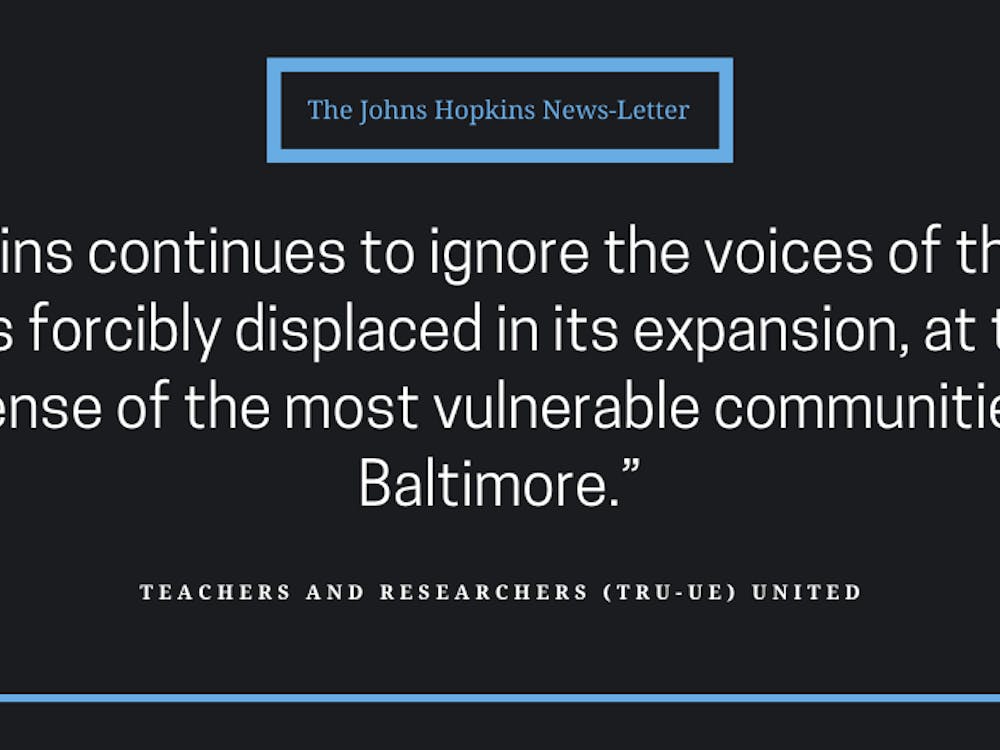The Student Government Association (SGA) addressed the University’s relationship with U.S. Immigration and Customs Enforcement (ICE) at their weekly meeting in Charles Commons on Tuesday at 7 p.m. They also discussed updates to their bylaws and general goals for SGA during the following academic year.
Sophomore Class President Sam Schatmeyer introduced the JHU-ICE Severance Resolution, which would formally ask University President Ronald J. Daniels and School of Education Dean Christopher Morphew to end the University’s relationship with ICE.
Schatmeyer said that he believed this vote was fundamentally about expressing the values of the student body.
“An organization like that has no business representing us as Hopkins students,” he said. “There are a lot of institutional issues with Hopkins, but I think this is a really easy one to fix. It’s a few contracts, and all you have to do is cut them.”
Senior Class Senator Jennifer Baron and junior Class Senator Pavan Patel questioned whether the proposed resolution could incite retaliation against the University and throw some its other federal contracts, which some departments and divisions rely on, into doubt.
In response, Sophomore Class Senator Sam Mollin emphasized that the University should do without those contracts and pay whatever the price is to avoid being complicit in ICE’s actions.
“We have to choose whether we want to prioritize... research funding that we can easily get from somewhere else or prioritize the lives of people that our federal government is abusing right now,” Mollin said.
Senior Class President Zanir Habib, however, proposed that SGA try to find a middle ground. He asked if it would be possible to take a less drastic approach and alter the University’s relationship with ICE instead of severing it completely.
Though Habib said that he does not agree with ICE’s current policies and actions, he asked that SGA remember that many ICE officials are just hard-working civil servants. He said the question of the University’s relationship with ICE should be brought up to SGA’s Policy Research and Development Commission (PRDC) in order to explore more options.
Nevertheless, the Resolution was approved unanimously, with two senators abstaining due to their involvement with government work or projects at the time.
SGA also introduced a funding bill to support an annual fundraiser for the United Service Organization (USO) called The Push. The event, hosted by Phi Gamma Delta and Hopkins ROTC this Saturday, involves Hopkins community members forming teams and racing to push a Humvee across a finish line.
Junior Preston Coffin presented on behalf of the event organizers, after which the bill passed with no votes against. If Hurricane Florence or other extenuating circumstances cause The Push to be cancelled, the funding would revert back to SGA.
Next, Executive Vice President AJ Tsang and Executive Secretary Aspen Williams reported on their recent trip to Loyola University Maryland to liaise with the student government body there and work toward building stronger institutional ties between the 17 Baltimore-area college student governments.
During the meeting, SGA also made changes to its bylaws. First, SGA re-authorized its Communications and Marketing Commission (CMC), which was created in 2015 but became inactive when members stopped using it. The CMC was informally active again over the summer to help promote SGA’s petition to host a referendum this fall that would allow the student body to vote directly on relevant issues.
The CMC will consist of five appointed aides who report to Williams. Williams nominated five sophomores to serve on the CMC — Olivia Brown, Zi Yi Jeffrey Chen, Rupsa Acharya, Royal Doolittle and Gabriel Silveira — all of whom promoted the petition over the summer.
Though all the nominees were confirmed, Mollin and Sophomore Class Senator Matthew Taj both asked that a more diverse pool of candidates be introduced next time. Because all the CMC aides were sophomores, they inquired if more aides could be added in the interim period to raise the level of diversity.
Second, SGA incorporated the PRDC, which will report to Tsang and include five appointed advisors, into their bylaws. A public application process for positions will soon be announced.
Finally, Executive President Noh Mebrahtu discussed some of his goals for his second term as president. He said he plans on setting aside the impartiality that he had previously assumed. Instead of only facilitating, Mebrahtu wants to use his position to more directly influence SGA deliberations and operations. One of his main areas of focus will be pushing for a University-wide smoking ban.
Mebrahtu also addressed how he would like to see SGA operate during the 2018-19 academic year.
“The one word that [keeps] coming back to me is this word: impact. I think about how much impact my time in SGA has done,” he said. “And one of the biggest critiques within SGA was its decision to not be proactive but to always be reactive.”






















Please note All comments are eligible for publication in The News-Letter.